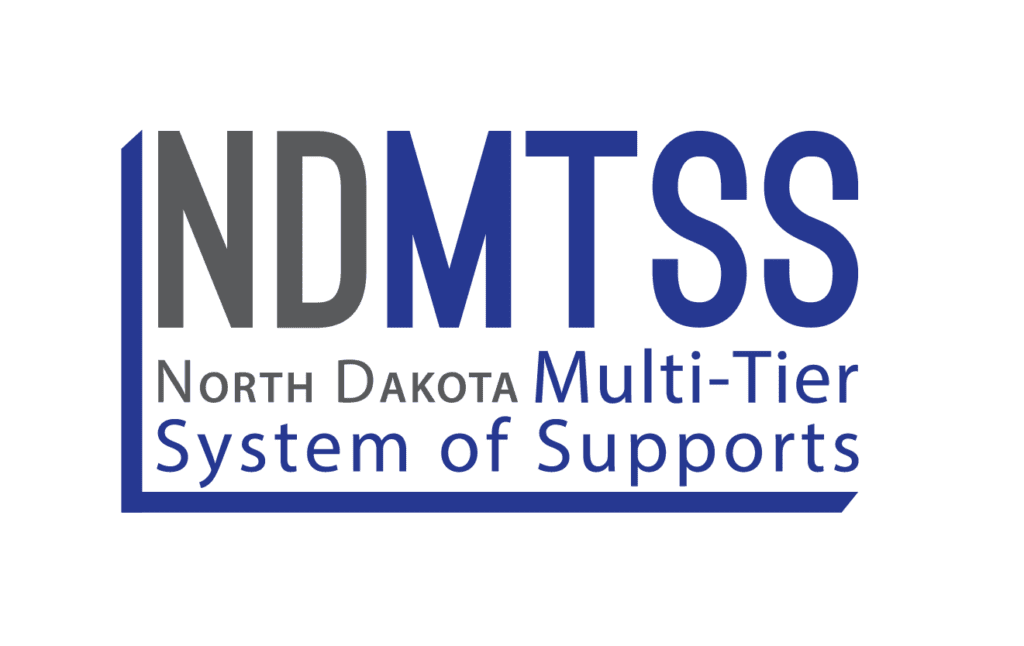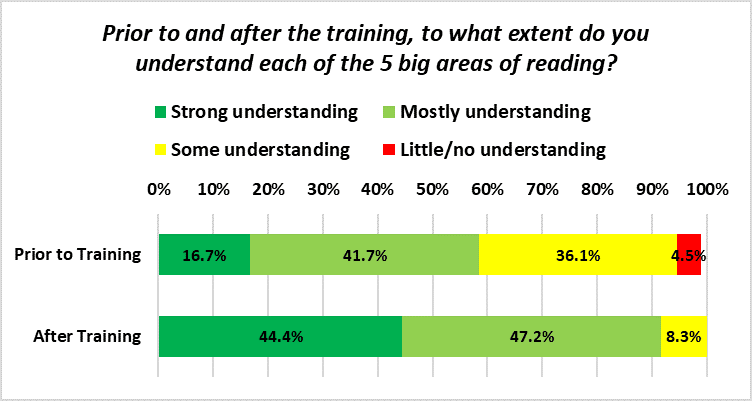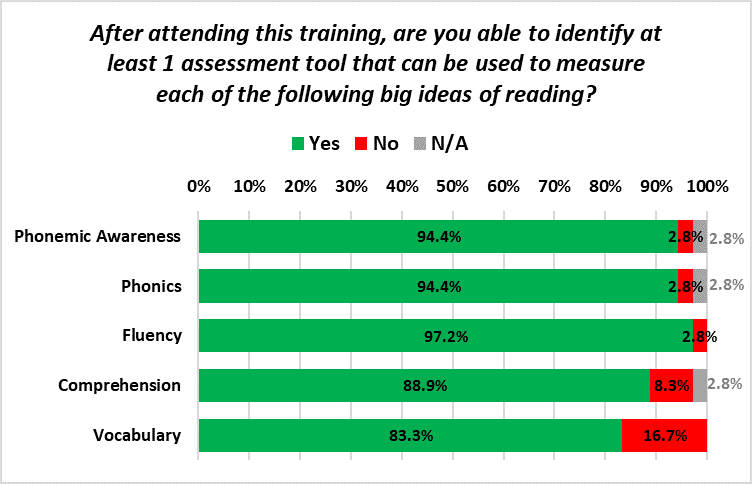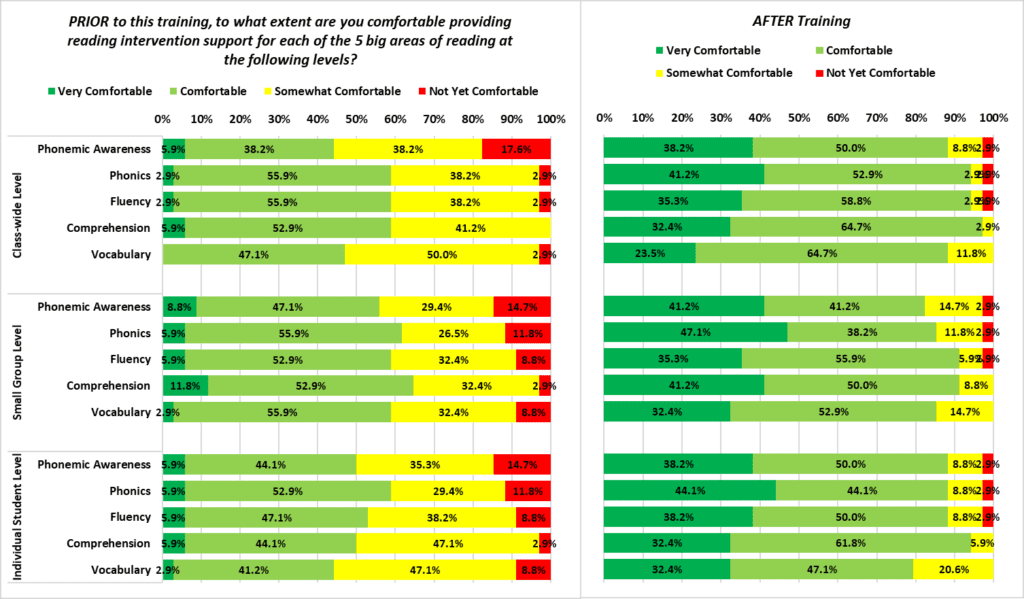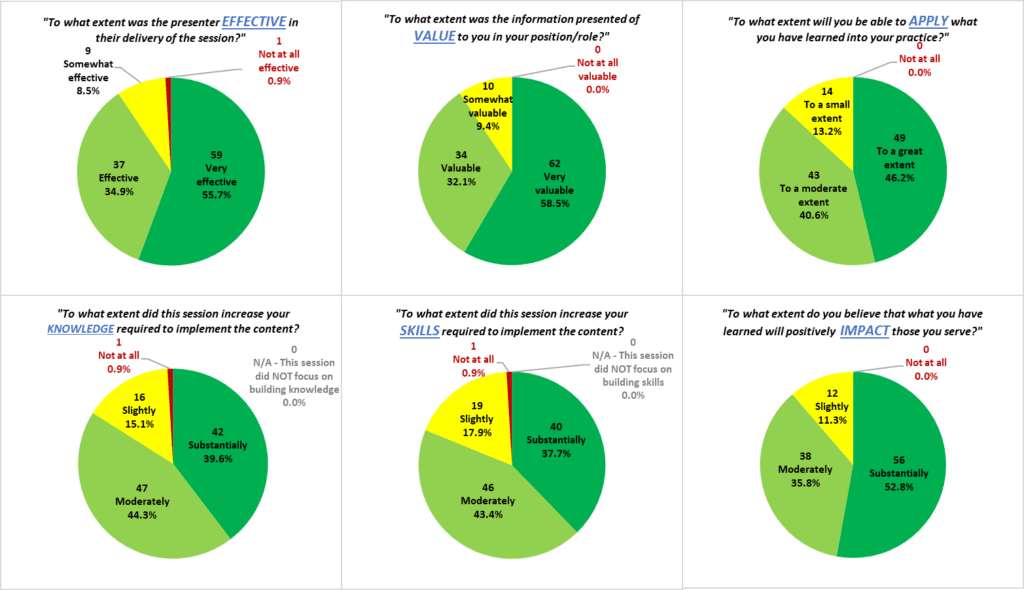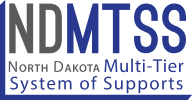Foundations of Reading Fall Cohort Wraps Up
Across six regional education associations, 13 school districts, and 14 individual buildings, nearly 40 educators invested in the NDMTSS Foundations of Reading series, aligned with the Science of Reading, to gain the knowledge, skills, and tools necessary to address a variety of students’ needs in reading. [Note: Register for the Spring 2022 Cohort here!]
“We TEACH reading in different ways, they [students] LEARN to read proficiently in only one way.” – David Kilpatrick
The 2000 National Reading Panel Report states that students need instruction in the essential components of reading, also known as the Five Big Ideas of Reading: phonological awareness, phonics, fluency, comprehension, and vocabulary. This series was held over three sessions, and multiple locations (Minot, Jamestown, Williston, and Bismarck sites) to target these five big ideas in three KEY areas:
- Instruction: Introduces research examining what it takes to be a successful reader and provides strategies for teaching those skills.
- Assessment: Explores how assessing reading skills can help students succeed when data is used to help them improve.
- Intervention: provides participants with a multitude of intervention strategies that will match diverse student needs and help students at the varying stages of their reading journeys.
This cohort began their 3-part series in early October, then met again in early November and wrapped their final session on November 29th. Each session showed a great gain of knowledge around the big five ideas of reading, ability to identify assessments, along with increased confidence in being able to provide reading intervention supports!
Following each day in the 3-day Foundations of Reading series, the power of knowledge within the essential components of reading, walking through instruction, assessment, and intervention as well as learning how to use the data to guide all of the science of reading components is evident as the participants analyze each of their own school's programs and adjust to meet North Dakota's goal 'to help every child become a successful reader by the end of 3rd grade.
(Colette Cunningham - CREA Professional Development Specialist & Foundations of Reading Facilitator)
Take a peek at some of the educator feedback shared,
I’ve told my Administrator our whole faculty would benefit from this training
(Elementary Teacher – Nedrose Public School)
I am so thankful for this class. I have been struggling with a curriculum that is lacking in a larger class with a wide variety of abilities. This gives me hope that I can close the gap more easily.
Elementary Teacher – Elgin-New Leipzig Elementary School)
It was literally THE BEST & most applicable & useful training I’ve attended in quite some time.
(Elementary Teacher – Nedrose Public School)
This was a very valuable training session. I learned many skills that I am so excited to bring back to my school.
(Special Ed. Teacher – Newburg-United Public School)
Instruction [Session 1]
The 1st session is designed to teach participants about the Big 5 areas of reading (Phonemic Awareness; Phonics; Fluency; Comprehension; Vocabulary) and the skills needed to teach them. Prior to the training, less than 60% of respondents indicated being at least “Mostly understanding” regarding each of the Big 5 areas of reading. After the training, this increased to 91.7% of participants, with 44.4% indicating having a “strong understanding.”
Assessments [Session 2]
The 2nd session is focused on reading assessments to assess student mastery of the 5 big areas of reading. Participants were asked if the training provided them with at least 1 tool to address each of the 5 big areas. Over 80% of participants reported “yes” across each of the areas, with 3 over 90% (Phonemic Awareness, Phonics, and Fluency) – see graph below. Additionally, 97.2% of participants reported having either a “Strong understanding” or were “Mostly understanding” of the different purposes for assessments after the training.
Interventions [Session 3]
The 3rd and final session’s goal is to teach participants about various reading interventions to address each of the 5 big ideas of reading. Looking at changes in participants’ level of comfortability in providing interventions at the Class-wide, Small Group, and Individual Student levels related to each of the 5 big areas of reading, each individual area showed notable growth across each of the three levels of intervention.
Prior to the training nearly all areas of reading across each of the three levels of intervention had between 50-60% of participants report being either “Very comfortable” or “Comfortable” implementing reading interventions. After the training, nearly all of these reading areas increased to over 80% of respondents, with multiple at 90% or higher. Comparing each of the big areas of reading few differences emerged in regard to participants’ level of comfortability, and additionally, there were few differences across the levels of intervention from Class-wide to Small Group to Individual.
Quality of Professional Learning
Overall, across all three sessions hosted a total of 106 PD Feedback Surveys were completed, representing 93.8% of the 113 total attendees: Session 1 – 38, Session 2 – 37, and Session 3 – 38.
- Participants responded largely favorable towards the professional learning they received with 90.6% of participants reporting the presenter as “Very effective” (55.7%) or “Effective” (34.9%) in their delivery of the content.
- Additionally, 90.6% of respondents felt that the content they received was either “Very valuable” (58.5%) or “Valuable” (32.1%) to them in their position/role.
- Similarly, 84.0% of participants indicated at least “Moderate” increases in their knowledge, and 81.1% in their skills as a result of the trainings received.
- 86.8% of participants reported that they will be able to apply what they learned to at least “a moderate extent”, with 46.2% indicating “to a great extent.”
- Lastly, nearly 90% of respondents perceived that what they learned would have at least a “Moderate” impact on those they serve, with over half (52.8%) reporting it would have a “Substantial” impact on them.
